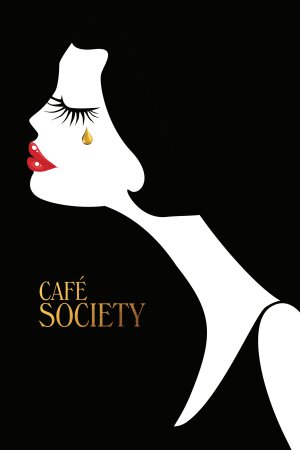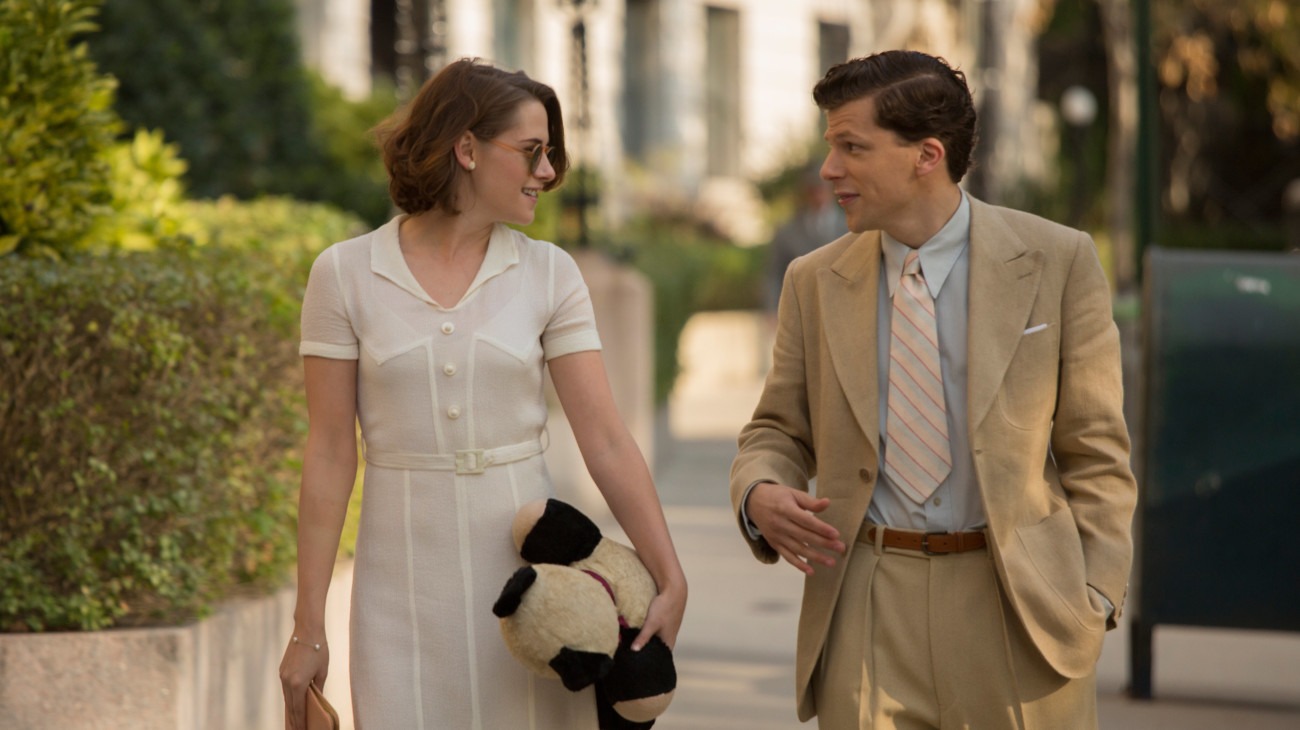
All the beautiful people
Let nobody say that Woody Allen is really as redundant and uninspired as all that. After 46 feature films spanning 50 years, the director's Café Society finally catches him doing something brand new: for the first time, he's made a film in color that is a genuine triumph of cinematography, as opposed to just reasonably good-looking by the standards of a generally ugly career. Working for the first time with the generally magnificent cinematographer Vittorio Storaro, Allen's latest is an exercise in sunny nostalgia for the 1930s that goes beyond merely capturing Los Angeles locations in a golden hour haze, though there is that.
The digitally-captured film - a first for both Allen and Storaro - uses the sharpness and color latitude of the format to great effect, depicting the images with the woozy beauty one would anticipate from an unabashed love letter to the glamor of the past, while also drawing on a very similar spirit as Storaro's Reds or The Conformist of the pre-WWII 20th Century as a lightly smoky world of leathery textures and soft focus interiors (the exteriors are generally much sharper and cleaner and use color more aggressively, with a shot of the Brooklyn Bridge at twilight that's one of the most striking images I've seen in a 2016 movie, the kind that makes you gasp in joyful shock when it swings into view; the understated but clear distinction between how insides and outsides are shot is probably the most interesting thing about the film's visuals). Obviously I'm not saying that Café Society looks better than, or even as good as The Conformist, but if I were to point out after you'd seen the film that they shared a cinematographer, I don't imagine that you'd be totally incapable of believing me. Given how many world-class cinematographers Allen has wasted over the years - Sven Nykvist, Vilmos Zsigmond, Darius Khondji - that's not a thing to take for granted.
As for the story and all that... look, Allen's great days are behind him and we all know they're not coming back. Coming hot on the heels of the truly dreadful Irrational Man, and two years after the merely unlikable and joyless Magic in the Moonlight, the bar here was not all that high, and Café Society clambers over it without a whole hell of a lot of room to spare. But clamber it does, and if damn little that goes on here will come as a surprise to anybody who's been keeping tabs on Allen's late career - which at this point has been going on for a solid 15 or 18 years, anyway - it hits all of its marks in a generally satisfying way, carried over the line by one of the most enticing-on-paper casts that Allen has worked with in years.
The place is Los Angeles, the year is 1935, and the setting, as promised by the title, is the world of the glamorous people of Hollywood. One of these is power agent Phil Stern (Steve Carell, whose innate likability nuances a stock "charming asshole" role in some interesting ways), a player of some note, who is known and respected by all the people it pays to be known and respected by. He's also the black sheep of a family that includes sister Rose Dorfman (Jeannie Berlin, such a natural fit for an Allen movie that it's an unforgivable scandal that they've never worked together before), all the way back in the Bronx, who calls him up one day to let him know that her son Bobby (Jesse Eisenberg) is coming to California to learn a bit about life and try to make it in Hollywood in some ill-defined aspect. Phil barely has time for his nephew, but Bobby does manage to meet up with Phil's secretary Vonnie (Kristen Stewart), who shows him around town, and who catches his dreamy, romantic attention in the process. For her part, Vonnie is too hung up on the married man she's been seeing, who she loves and who loves her, and who happens to be Phil himself.
Allen has indicated that he wanted the plot of Café Society to unfold like a novel, and that's impressively close to what ends up happening. Without spoiling anything, the film's last two-fifths or thereabouts make a rather complete geographic, chronological, and emotional break with everything that happened before, not exactly starting a new movie so much as following along as Bobby dramatically reshapes his life in an attempt to fix it. The genre changes into a classic Hollywood-type story of gangsters and the wild life of '30s New York (though the genial light comic tone, more wistful than funny, remains), the stakes move around, and the nature of the Bobby/Vonnie relationship evolves into something that is, yes, very literary. Perhaps in the derogatory sense of "literary"; as so often happens the case in Allen's filmography, particularly latter-period Allen, characters have a tendency to speak in suspiciously over-articulated sentences, and the themes have the distinct upper-middle class mustiness of, say, an Atlantic short story from somewhere in the middle of the 20th Century. Which is also, of course, quite typical of Allen.
Even so, the film is mostly a pleasure to watch thanks to its lovely imagery and the efforts of a pretty sharp cast: Eisenberg, in particular, gives a performance leagues beyond his clumsy nebbish in Allen's To Rome with Love, and should certainly be reckoned among the top echelons of actors who aren't Woody Allen playing the Woody Allen surrogate. Partially this is because his idling position as an actor isn't terribly far from Allen's own, though Eisenberg tends to be shorter tempered. That's not on display here, and yet there's still the feeling that he's filtering the Allen Character through his own sensibility to make something that's unique from either man individually. The result is one of the freshest leads in an Allen movie in quite a long time, right up at the same level as Owen Wilson's similarly personalised version of Allen in Midnight in Paris, and on top of everything else that's going mostly right in the film, Eisenberg is more than enough to make deeply overfamiliar material feel, if not "new", then at least thoroughly pleasant as a better-than-necessary diversion.
The digitally-captured film - a first for both Allen and Storaro - uses the sharpness and color latitude of the format to great effect, depicting the images with the woozy beauty one would anticipate from an unabashed love letter to the glamor of the past, while also drawing on a very similar spirit as Storaro's Reds or The Conformist of the pre-WWII 20th Century as a lightly smoky world of leathery textures and soft focus interiors (the exteriors are generally much sharper and cleaner and use color more aggressively, with a shot of the Brooklyn Bridge at twilight that's one of the most striking images I've seen in a 2016 movie, the kind that makes you gasp in joyful shock when it swings into view; the understated but clear distinction between how insides and outsides are shot is probably the most interesting thing about the film's visuals). Obviously I'm not saying that Café Society looks better than, or even as good as The Conformist, but if I were to point out after you'd seen the film that they shared a cinematographer, I don't imagine that you'd be totally incapable of believing me. Given how many world-class cinematographers Allen has wasted over the years - Sven Nykvist, Vilmos Zsigmond, Darius Khondji - that's not a thing to take for granted.
As for the story and all that... look, Allen's great days are behind him and we all know they're not coming back. Coming hot on the heels of the truly dreadful Irrational Man, and two years after the merely unlikable and joyless Magic in the Moonlight, the bar here was not all that high, and Café Society clambers over it without a whole hell of a lot of room to spare. But clamber it does, and if damn little that goes on here will come as a surprise to anybody who's been keeping tabs on Allen's late career - which at this point has been going on for a solid 15 or 18 years, anyway - it hits all of its marks in a generally satisfying way, carried over the line by one of the most enticing-on-paper casts that Allen has worked with in years.
The place is Los Angeles, the year is 1935, and the setting, as promised by the title, is the world of the glamorous people of Hollywood. One of these is power agent Phil Stern (Steve Carell, whose innate likability nuances a stock "charming asshole" role in some interesting ways), a player of some note, who is known and respected by all the people it pays to be known and respected by. He's also the black sheep of a family that includes sister Rose Dorfman (Jeannie Berlin, such a natural fit for an Allen movie that it's an unforgivable scandal that they've never worked together before), all the way back in the Bronx, who calls him up one day to let him know that her son Bobby (Jesse Eisenberg) is coming to California to learn a bit about life and try to make it in Hollywood in some ill-defined aspect. Phil barely has time for his nephew, but Bobby does manage to meet up with Phil's secretary Vonnie (Kristen Stewart), who shows him around town, and who catches his dreamy, romantic attention in the process. For her part, Vonnie is too hung up on the married man she's been seeing, who she loves and who loves her, and who happens to be Phil himself.
Allen has indicated that he wanted the plot of Café Society to unfold like a novel, and that's impressively close to what ends up happening. Without spoiling anything, the film's last two-fifths or thereabouts make a rather complete geographic, chronological, and emotional break with everything that happened before, not exactly starting a new movie so much as following along as Bobby dramatically reshapes his life in an attempt to fix it. The genre changes into a classic Hollywood-type story of gangsters and the wild life of '30s New York (though the genial light comic tone, more wistful than funny, remains), the stakes move around, and the nature of the Bobby/Vonnie relationship evolves into something that is, yes, very literary. Perhaps in the derogatory sense of "literary"; as so often happens the case in Allen's filmography, particularly latter-period Allen, characters have a tendency to speak in suspiciously over-articulated sentences, and the themes have the distinct upper-middle class mustiness of, say, an Atlantic short story from somewhere in the middle of the 20th Century. Which is also, of course, quite typical of Allen.
Even so, the film is mostly a pleasure to watch thanks to its lovely imagery and the efforts of a pretty sharp cast: Eisenberg, in particular, gives a performance leagues beyond his clumsy nebbish in Allen's To Rome with Love, and should certainly be reckoned among the top echelons of actors who aren't Woody Allen playing the Woody Allen surrogate. Partially this is because his idling position as an actor isn't terribly far from Allen's own, though Eisenberg tends to be shorter tempered. That's not on display here, and yet there's still the feeling that he's filtering the Allen Character through his own sensibility to make something that's unique from either man individually. The result is one of the freshest leads in an Allen movie in quite a long time, right up at the same level as Owen Wilson's similarly personalised version of Allen in Midnight in Paris, and on top of everything else that's going mostly right in the film, Eisenberg is more than enough to make deeply overfamiliar material feel, if not "new", then at least thoroughly pleasant as a better-than-necessary diversion.






